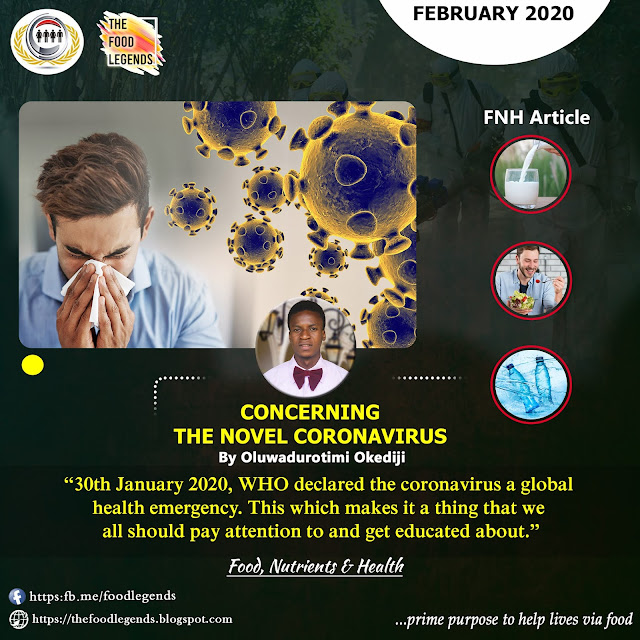 |
| Coronavrus WHO |
30th January 2020, WHO declared the coronavirus a global health emergency. This which makes it a thing that we all should pay attention to and get educated about. Although as at now, Egypt is still the only African country affected.
According to the WHO, Coronaviruses (CoV) are a large family of viruses that cause illness ranging from the common cold to more severe diseases such as Middle East Respiratory Syndrome (MERS-CoV) and Severe Acute Respiratory Syndrome (SARS-CoV). A novel coronavirus (nCoV) is a new strain that has not been previously identified in humans.
They have a crown like structure, from which they earned their name “Corona”. There are different types of the viruses, major causing respriratory problems and sometimes affecting the gastrointestinal system. It was first associated with a group of people who have been associated with seafood and live animals market in Wuhan, China. A big challenge of these viruses is their being highly communicable. After that initial scene, several other people in China began to be identified with pneumonia cases. And then a spread began to other countries outside of China.
A characteristic of the viruses is that they are transmitted between animals and people. The very mode of transmission of the virus isn’t fully discovered yet. However, being a respiratory problem, we can consider the general template for respiratory problems infection, just like the transfer of virus particles into the air when an infected patient sneezes. This which could make those in close contact with the infected person to get infected too.
WHO explains to us that signs of infection include fever, cough and breathing difficulties. When the case is much more severe, symptoms like pneumonia, multiple organ failure and even death may occur. Symptoms are often displayed after five to six days of infection. However, some people are asymptomatic, meaning that even though they are infected, they wouldn’t display the symptoms.
How do we know who is infected, a medical test called PCR (Polymerase Chain Reaction) is performed on the individual. The test identifies the virus based on its genetic fingerprint. As considered currently, there are no specific treatment nor vaccine to cure the virus. Treatment and Vaccines are still in development
A total of 77,273 coronavirus cases have been reported worldwide, and about 2,250 deaths recorded at present. Extremely high percentage of the number occurring in China. The novel coronavirus COVID-19 is affecting 32 countries and territories around the world and 1 international conveyance (the "Diamond Princess" cruise ship harbored in Yokohama, Japan).
The outbreak has been declared a global health emergency. There have been five global health emergencies since 2005 when the declaration was formalised: swine flu in 2009, polio in 2014, Ebola in 2014, Zika in 2016 and Ebola again in 2019.
Important prevention practices include
- Regular washing of hands
- Practicing respiratory hygiene
- Maintain at least 1 metre (3 feet) distance between yourself and other people, particularly those who are coughing, sneezing and have a fever.
- Avoid touching eyes, nose and mouth. Doing so, you may transfer the virus from surfaces to yourself
- If you have mild respiratory symptoms and no travel history to or within China, carefully practice basic respiratory and hand hygiene and stay home until you are recovered, if possible.
- If severe, seek medical care early
- Avoid consumption of raw or undercooked animal products
- Educate yourself the more by visiting trusted site for updates as regards the virus. (References available at the end of the article).
Oluwadurotimi Okediji
Food, Nutrients & Health
………………………………………………………………….
You may also visit the references below to get more information about coronavirus.
References









Nice piece
ReplyDelete